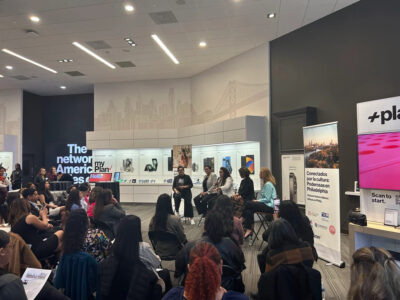The pandemic has shown how a lack of digital resources can negatively impact the way people work, learn and live their lives. However, gaps in broadband service and device access already existed before COVID-19, and have only been exacerbated by the circumstances.
This digital divide has an impact on local economies. According to a new report by the Federal Reserve Bank of Philadelphia Economic Growth and Mobility Project Analyst Alvaro Sanchez and Senior Economic Analyst of Economic Research Adam Scavette, areas across the United States where residents had limited broadband and computer access also had less engaged labor forces.
The Philly Fed found a gap of 17 percentage points in the labor force participation rates between prime-age people (ages 25-54) who do and do not have a computer with broadband access in the Philadelphia metro area. This means 7 out of 10 residents who do not have a computer with broadband access participate in the labor force, while almost 9 out of 10 residents with broadband and computer access participate in the local labor force.
Of the 25 most populated metropolitan areas in America, Philly Fed researchers found this to be the largest labor force participation gap.
Read the full report“One of the key things we found is that with prime-age workers, having access to a broadband computer is you’re more likely to participate in labor force,” Sanchez said. “It’s not just about being able to do leisurely activities and doing work.”
Along with gaps, the report also sought to offer a look at potential solutions. It detailed an access policy, supported by its findings, that could bring 400,000 residents into the labor force across American metro areas by providing more broadband access to communities.
Once you start talking about broadband access across regions, you have to talk about economic opportunities for people.
“For the access policy, we wanted to have a theoretical thought experiment,” Scavette said. “What if someone gave the unserved metro residents broadband [-enabled] computers? How would that increase labor participation rate? What we found was that if you went across 380 metro areas, 400,000 people would be added to the labor force. Based on an empirical report by [Rutgers University professor] Hilal Atosoy looking at broadband access from the ’90s into the ’00s, we just took a parameter of that and applied that to population in current metro areas. In some cities you see higher increases than others.”
Sanchez hopes to see more cross-sector collaboration that can help bridge the gap. A lack of broadband access is highly correlated with poverty rates. It’s an income equity and race equity issue.
“In terms of progress, any sort of collaboration between the public and private sector is a win,” Sanchez said. “That’s a win for people living in predominatly Black and Latino communities that struggle to get broadband access. We want to emphasize that when we’re talking about broadband access, we’re [also] talking about racial equality. Once you start talking about broadband access across regions, you have to talk about economic opportunities for people.”
Michael Butler is a 2020-2022 corps member for Report for America, an initiative of The Groundtruth Project that pairs young journalists with local newsrooms. This position is supported by the Lenfest Institute for Journalism.Join the conversation!
Find news, events, jobs and people who share your interests on Technical.ly's open community Slack

Philly daily roundup: A better coffee supply chain; Philly Tech Week returns; Apply to Pennovation Accelerator

Philly daily roundup: Startups want office culture; New Venture Lab cohort; Penn Med's new AI leader

Will the life sciences dethrone software as the king of technology?


